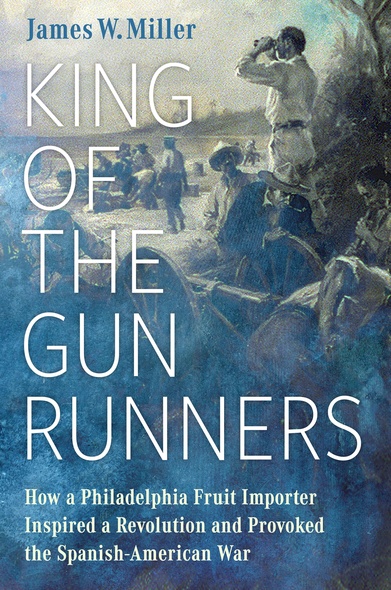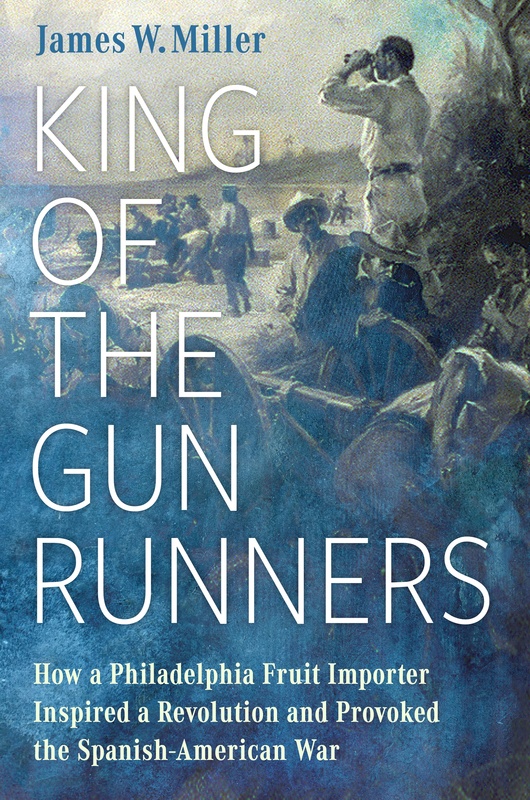
King of the Gunrunners
How a Philadelphia Fruit Importer Inspired a Revolution and Provoked the Spanish-American War
By the time he turned thirty at the end of the nineteenth century, John D. Hart thrived as the busiest importer of bananas on the East Coast. A master of ships with a thunderous voice, Hart aggressively carried tropical fruit to an insatiable market with little concern for notions of supply and demand. But when an unexpected crisis hit the fruit business, Hart was unprepared. The financial Panic of 1893 doomed his strategy of bringing in limitless bananas. Jobless consumers could not afford such luxuries. Nearing bankruptcy, Hart was approached by Emilio Nuñez, a member of the Cuban Revolutionary Party—a cadre of exiled conspirators in New York whose singular purpose was to liberate the Cuban island from four hundred years of Spanish rule. Nuñez enlisted Hart as a “filibuster” to transport guns and ammunition to the Cuban rebels. For nearly three years, Hart became the most visible of a disparate group of mariners between New York and Key West who tormented Spanish authorities, riled the US government, and became heroes to an oppressed people fighting to be free.
In King of the Gunrunners: How a Philadelphia Fruit Importer Inspired a Revolution and Provoked the Spanish-American War, author James W. Miller reveals the untold story of a forgotten American whose adventures helped pave the way for the United States’ emergence as an international power. With the Yellow Press trumpeting his exploits, Hart’s influence helped inflame the nation’s mood and made war with Spain inevitable. The quick US victory in what became known as the Spanish-American War compelled Spain to abandon Cuba and cede sovereignty over Guam, Puerto Rico, and the Philippines to the United States, which also annexed the independent state of Hawaii during the conflict. This volume presents the story of Hart, the defiant king of the Cuban gunrunners, who prolonged a revolution, provoked a war, and left an indelible mark on history.
James W. Miller’s King of the Gun Runners brings this slice of the Gilded Age to rambunctious life…To read King of the Gun Runners is to escape into an exciting and deftly illustrated era of the American past and better understand how this chapter forms the prologue of the country’s subsequent complicated relationships with the ‘banana republics’ we would fail to remake in our own image.
Jim Miller has given us a swashbuckling tale of a larger-than-life American hero, John D. Hart. This Philadelphia banana tycoon is at the heart of Miller’s riveting story of spies, gunrunners, pirates, and international diplomacy. Who would have guessed that the acolytes of José Martí, Cuban philosopher, poet, and nationalist, would entice an American banana importer to ship arms that fueled a revolution? And how did this help bring America into the war that ended Spain’s colonial rule in Cuba? You will have to read Miller’s fine book to find the answers. It’s a page-turner.
As time marches on, important events in history and the critical actors who affected the outcome of those events can fade into oblivion. In King of the Gunrunners, author James W. Miller allows us to vividly recall John D. Hart, a rascally, tenacious, yet unsung hero of Cuba’s revolt from Spain’s cruel dominance in the 1890s. Miller’s exquisitely detailed account of Hart’s remarkable efforts to get vital weaponry to the Cuban revolutionaries is a lesson for all ages. Miller weaves the fascinating but true tale of how Hart’s blustery and, at times, bullheaded persistence, risking death and imprisonment, overcame ham-handed law enforcement efforts that stood in his way. Hart’s refusal to take ‘no’ for an answer at almost every turn is a lesson to all who struggle for freedom, even in today’s world.
James W. Miller’s King of the Gunrunners is a massively researched treatise on liberty centering on John D. Hart, an American fruit importer who assisted Cuba’s efforts to oust Spanish rule during the Gilded Age. Miller’s literary and historical acumen in this previously untold story reveals how American bureaucratic lunacy and political wrangling targeted Hart and interfered with the Cuban struggle. But Hart prevailed thanks to the biases of the ‘Yellow Press’ which embraced the Cuban struggle and made Hart a public hero. King of the Gunrunners captures the passion for liberty that is as relevant today as it was during the Gilded Age, the so-called ‘quiet period’ between the Civil War and World War I that launched America’s emergence as a global superpower.
In the netherworld of gunrunners and arms traffickers, the persona of the filibuster has long dwelled in the murky obscurity of illegality. To a lesser or greater extent, the filibuster played a decisive supporting role in the cause of Cuba Libre. James W. Miller draws filibuster John D. Hart out from the shadows into full view and into the fullness of his environment. Against the backdrop of national and international tensions, Miller provides a vivid and textured account of the ‘business’ of the filibuster, in pursuit of pecuniary interests and in discharge of well-meaning sympathies, always something of a ubiquitous presence among Cuban patriots engaged in the politics of war.
A detailed and entertaining glimpse into the operations of American gunrunners and the complexity of their interactions with Cuban revolutionaries.
James W. Miller is retired athletics director at the University of New Orleans. Prior to his tenure there, he spent eleven years as a newspaper reporter and twenty-one years in the NFL, where he worked for the New Orleans Saints, Buffalo Bills, and Chicago Bears. He is author of Integrated: The Lincoln Institute, Basketball, and a Vanished Tradition.
Acknowledgments
Prologue
Chapter 1: A Wondrous World
Chapter 2: A New Revolution
Chapter 3: Scrambling for Ships
Chapter 4: The Wealthy and Useful Ker
Chapter 5: The Director of Expeditions
Chapter 6: A Lesson in Competition
Chapter 7: Fully Vested in the Filibuster Business
Chapter 8: Not a Man of Patience
Chapter 9: “Until Cuba Is Free”
Chapter 10: A Clear Victory in Court
Chapter 11: Spanish Spies and US Marshals
Chapter 12: “Captain Dynamite” Johnny O’Brien
Chapter 13: A Quick Indoctrination into Filibuster Protocol
Chapter 14: A Booming Reply of “NOT GUILTY!”
Chapter 15: “Damfoolitis”
Chapter 16: Prosecution or Persecution?
Chapter 17: An Ambitious Expedition
Chapter 18: A Worst-Case Scenario
Chapter 19: Publicity Agent for an Expedition
Chapter 20: “You Don’t Often See a Man Like Him”
Chapter 21: “Justly Convicted”
Chapter 22: The Laurada’s Last Expedition
Chapter 23: Captain Dynamite’s Expedition to Havana
Chapter 24: Broke and Headed for Prison
Chapter 25: The King of the Gunrunners Is Affirmed
Chapter 26: Perceived Wrongs and Righteous Rights
Chapter 27: The Maine Explodes, and Hart Goes to Prison
Chapter 28: A Full and Complete Pardon
Chapter 29: The Importing Business Had Changed
Chapter 30: He Took Up the Cause and Suffered for It
Epilogue
Source Notes
Bibliography
Index





